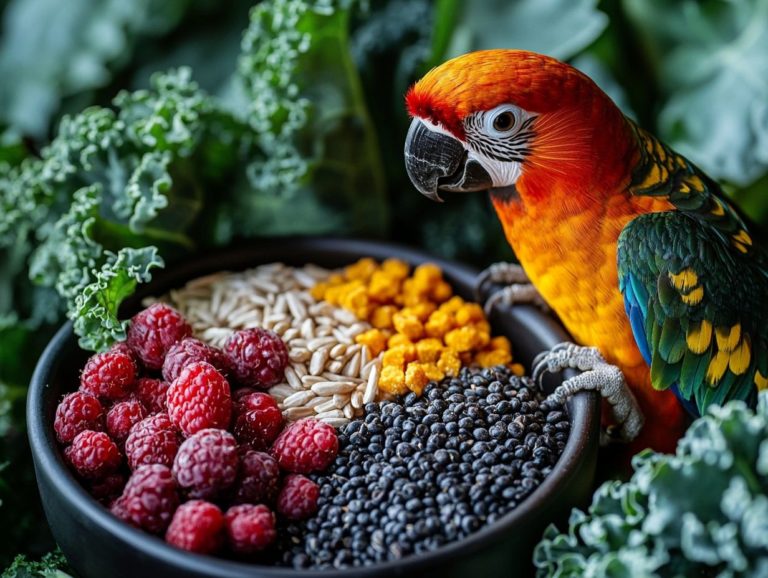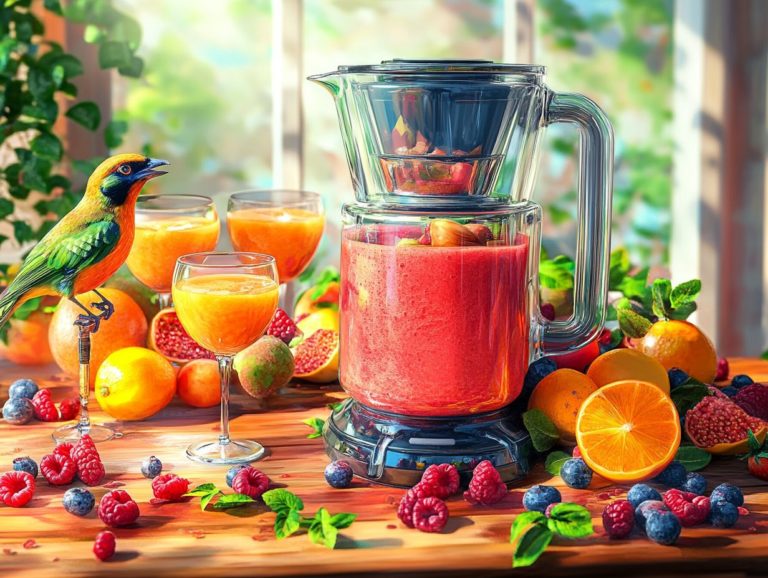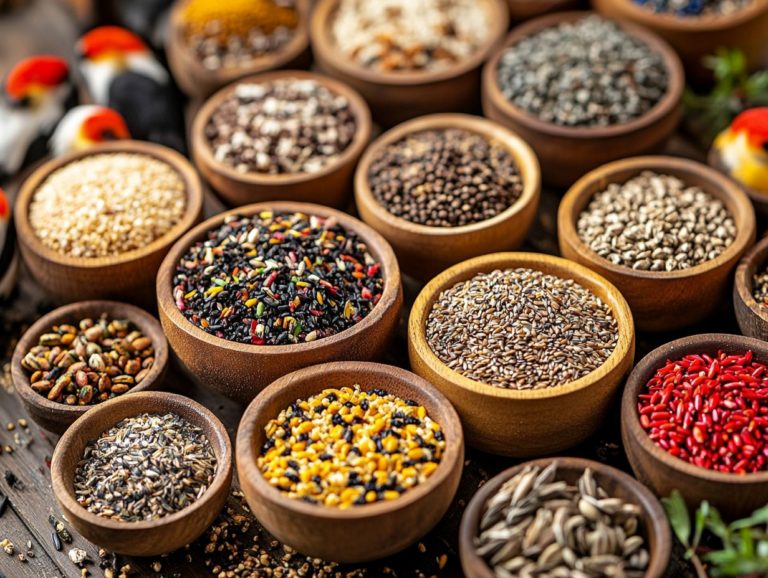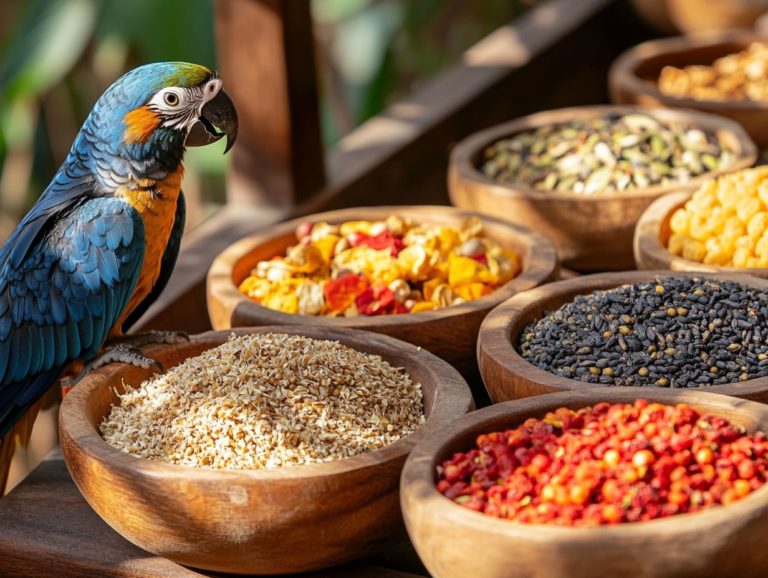Creating a Balanced Menu for Your Pet Bird
Your journey to better bird nutrition starts now! Let’s dive into the essentials that will keep your bird happy and healthy.
Contents
- Key Takeaways:
- Understanding Your Pet Bird’s Nutritional Needs
- Building a Balanced Diet for Your Bird
- Recommended Foods and Portions
- Supplementing Your Bird’s Diet
- Common Nutritional Deficiencies in Pet Birds
- Creating a Fun and Healthy Menu Plan for Your Bird
- Frequently Asked Questions
- What is the importance of creating a balanced menu for my pet bird?
- What should be included in a balanced menu for a pet bird?
- How often should I feed my pet bird a balanced menu?
- Can I give my pet bird treats as part of their balanced menu?
- What are some common mistakes to avoid when creating a balanced menu for my pet bird?
- Do different species of pet birds require different balanced menus?
Key Takeaways:
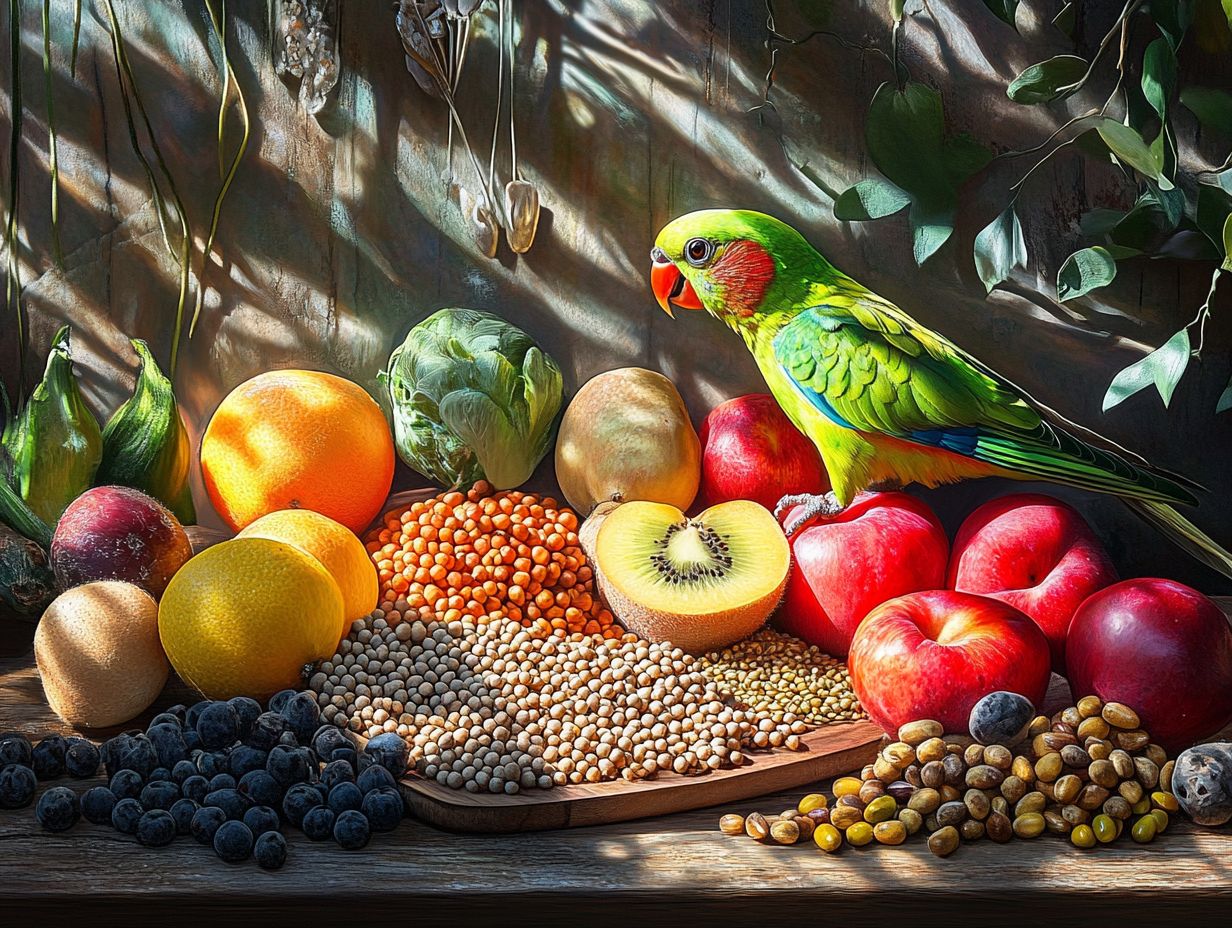
- Discover your pet bird’s nutritional needs by including essential nutrients like protein, carbs, and vitamins for great health.
- Create a vibrant diet by mixing recommended foods and portion sizes for optimal nutrition.
- Supplement your bird’s meals with fresh fruits, vegetables, and occasional treats while being mindful of when and how to do so.
Understanding Your Pet Bird’s Nutritional Needs
Understanding your pet bird’s nutritional needs is vital for ensuring its optimal health and well-being. A balanced diet, abundant in a variety of nutrients, helps them grow well and promotes overall vitality.
To provide the best for your feathered companion, aim for a diet that combines high-quality bird food with an assortment of nuts. Include fresh fruits like apples and berries, and nutritious vegetables such as broccoli and carrots. This harmonious blend supports digestive health while delivering essential proteins and healthy fats, ensuring your bird thrives.
Key Nutrients for Optimal Health
To maintain optimal health for your pet birds, provide a variety of key nutrients, including vitamins, minerals, and fatty acids crucial for their growth and energy levels.
Among these essential nutrients, vitamin E is particularly important for supporting the immune system of your feathered friends. Meanwhile, omega-3 fatty acids significantly contribute to heart health. Don t overlook fiber; it plays a vital role in proper digestion and helps prevent gastrointestinal issues.
To ensure their dietary needs are thoroughly met, incorporate a diverse range of food sources:
- Nuts
- Fruits
- Vegetables
These not only deliver vital nutrients but also keep meals exciting and appealing for your birds. Dietary supplements can also help fill any nutritional gaps and promote a vibrant, active lifestyle for your companions.
Building a Balanced Diet for Your Bird
Craft a balanced diet for your bird to ensure its health and happiness. Start by introducing a variety of food options, such as high-quality pellets, wholesome home-cooked meals, and nutritious snacks that align with their natural foraging instincts. For more detailed guidance, check out this feeding schedule for your bird.
A diet abundant in nuts, fruits, and vegetables, alongside specially formulated pellets, supports good nutrition, which is vital for sustaining energy levels and enhancing overall well-being.
Recommended Foods and Portions
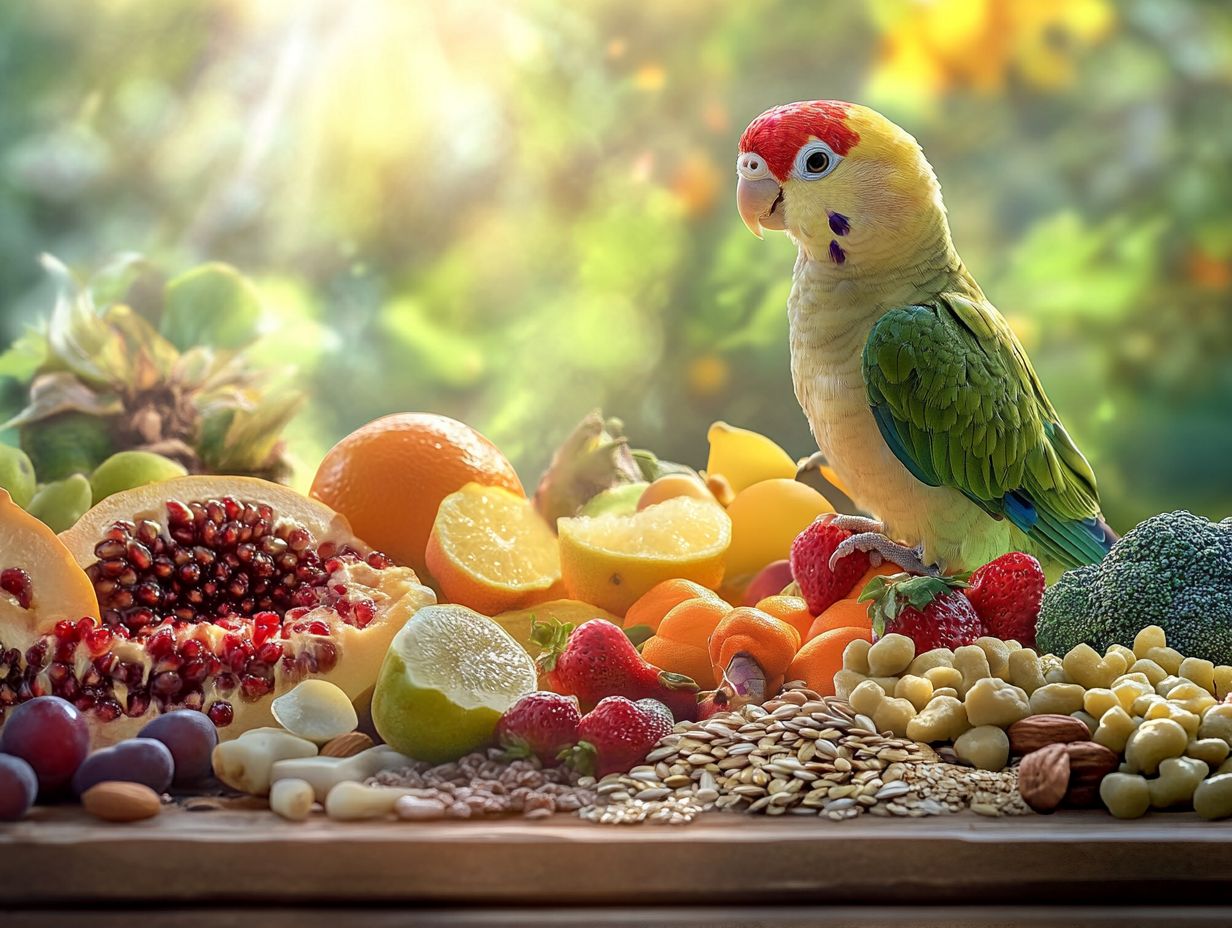
When choosing foods and portions for your pet bird, it’s important to provide a variety of bird food. Include nuts like pistachios and walnuts, fruits such as mangoes and berries, and vegetables like kale and carrots. Be mindful of the right portions to maintain a healthy weight.
These foods deliver necessary vitamins and support overall health. For instance, leafy greens like kale are rich in fiber, promoting good digestion. Fruits like berries provide antioxidants that protect cellular health. Nuts are high in healthy fats needed for energy but should be given in moderation to avoid extra calorie intake. Watching serving sizes like a small handful for nuts and a couple of tablespoons for veggies can help keep your bird’s weight on track.
Healthy snacks like sprouted seeds or air-popped popcorn can also satisfy their cravings without compromising their diet.
Supplementing Your Bird’s Diet
Supplementing your bird’s diet is essential to ensure it gets all the nutrients it needs. This is especially important if regular meals lack adequate levels of protein, healthy fats, or vitamin E key components for best growth and health.
When and How to Supplement
Knowing when and how to enhance your bird’s diet is crucial for its well-being. Dietary supplements can provide important nutrients, such as healthy fats and proteins, that might be missing from regular meals.
For example, during molting, breeding, or as your bird ages, it may need extra support to thrive. Pet owners often notice their birds becoming lethargic or observing changes in their plumage, which can indicate nutritional deficiencies.
When choosing supplements, prioritize organic and non-GMO options for the best quality. While these can be helpful, they should never replace whole foods in your bird’s diet.
A balanced diet with fresh fruits, vegetables, and high-quality pellets will nicely complement any supplements, ensuring your bird gets the comprehensive nutrition it needs for good health.
Common Nutritional Deficiencies in Pet Birds
Understanding common nutritional deficiencies in pet birds is vital. Recognizing the symptoms and acting quickly with solutions can prevent health issues.
Being proactive in your bird’s nutrition is key to its well-being and longevity.
Symptoms and Solutions
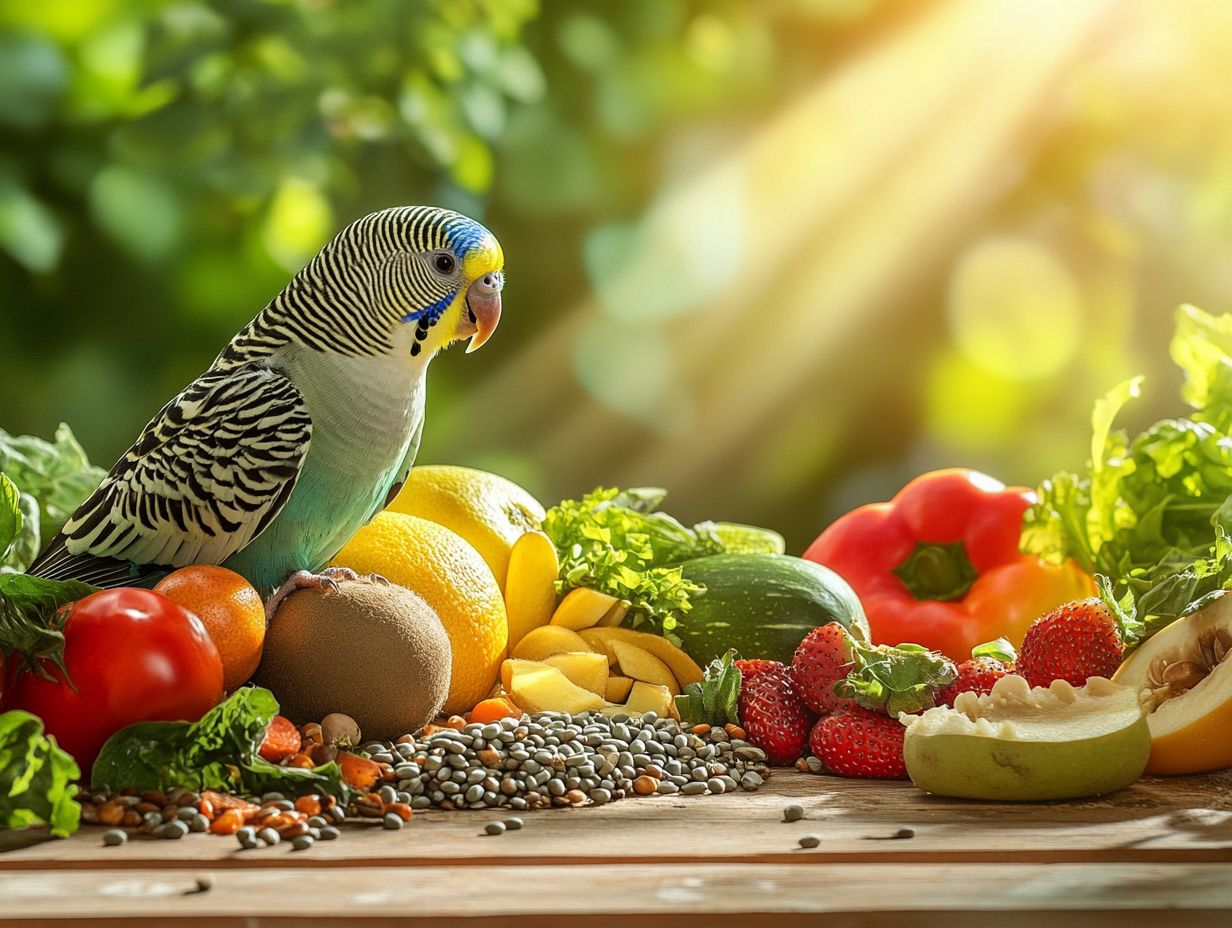
Nutritional deficiencies can show up in various ways, like changes in plumage, lethargy, or digestive issues, indicating a need for dietary evaluation and adjustment.
If your bird’s feathers appear lackluster, it may be lacking essential antioxidants, leading to dull and brittle plumage. If your pet seems unusually fatigued or less playful, it might not be getting enough protein.
To tackle these issues, consider adding a diverse range of fresh vegetables and high-quality pellets packed with vitamins and minerals. You can also introduce specific supplements, like omega fatty acids or protein-rich seeds, to restore balance and support your bird s overall well-being, ensuring a lively companion.
Creating a Fun and Healthy Menu Plan for Your Bird
Creating a fun and healthy menu plan for your pet bird is essential! This thoughtful approach ensures its dietary needs are met through a carefully selected mix of foods that match its natural foraging behavior and preferences, as outlined in how to create a bird-friendly diet plan.
Start today to improve your bird’s diet for a happier, healthier life!
Tips and Tricks for Meal Planning
Meal planning for your pet bird can be easy. Just follow a few simple tips to ensure your feathered friend has a balanced and diverse diet.
Incorporate different food types for a balanced diet. Use seeds, pellets, fruits, and vegetables to provide essential nutrients. Keep these foods fresh to make them more appealing and to prevent dietary deficiencies.
Adjust portion sizes based on your bird’s activity level. A more active bird may need a bit more fuel to keep up their energy.
Opting for high-quality pet food is essential to ensure your bird receives vital vitamins and minerals. Turn mealtime into an adventure! Experiment with fun snacks like small pieces of apple or leafy greens. Your bird will love exploring new tastes and this encourages more adventurous eating habits.
Frequently Asked Questions
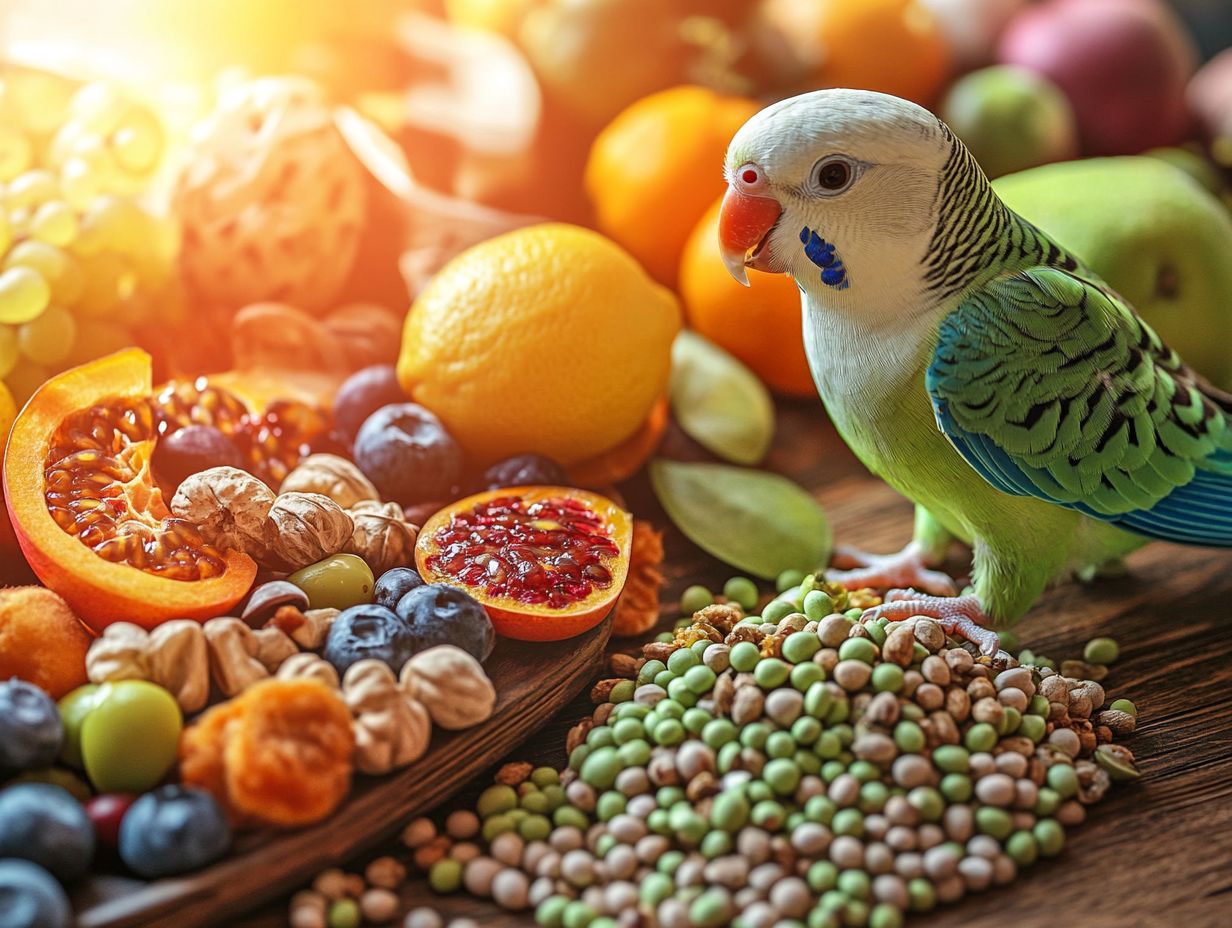
Creating a balanced menu for your pet bird is crucial for their overall health and well-being. A balanced diet for your bird provides essential nutrients and helps prevent health problems such as obesity and malnutrition.
A balanced menu for a pet bird should include a variety of fresh fruits and vegetables, high-quality bird seed, and a source of protein such as cooked eggs or chopped nuts, as well as understanding the benefits of a varied diet for pet birds.
Feed your pet bird a balanced menu twice a day, in the morning and evening. This ensures they get enough nutrients throughout the day.
Yes, treats can be included in a balanced menu, but they should not make up the majority of their diet. Give treats in moderation and choose healthy options, like dried fruits or small pieces of whole-grain bread.
Avoid feeding too many high-fat or high-sugar treats, not providing enough variety in their diet, and not consulting with a veterinarian for specific dietary needs.
Yes, different species of pet birds may have different dietary needs. Research your specific bird’s dietary requirements and consult with a veterinarian for necessary adjustments to their balanced menu.

